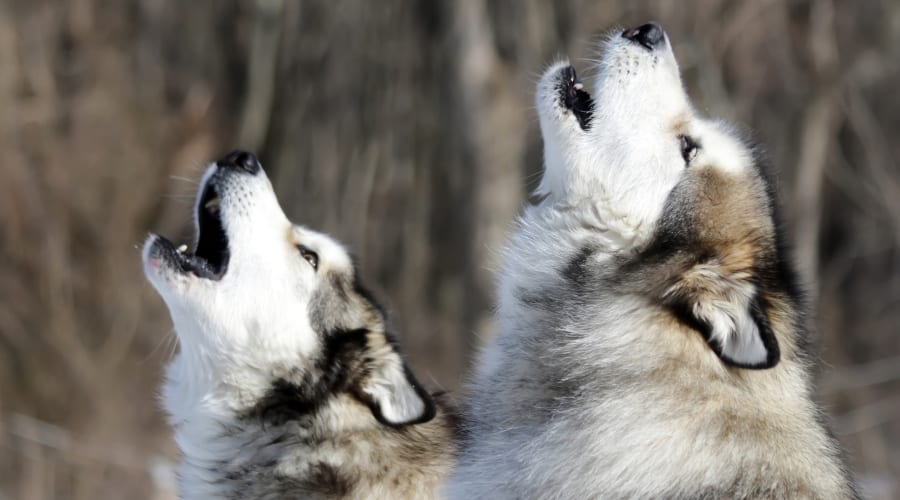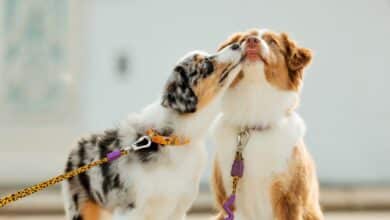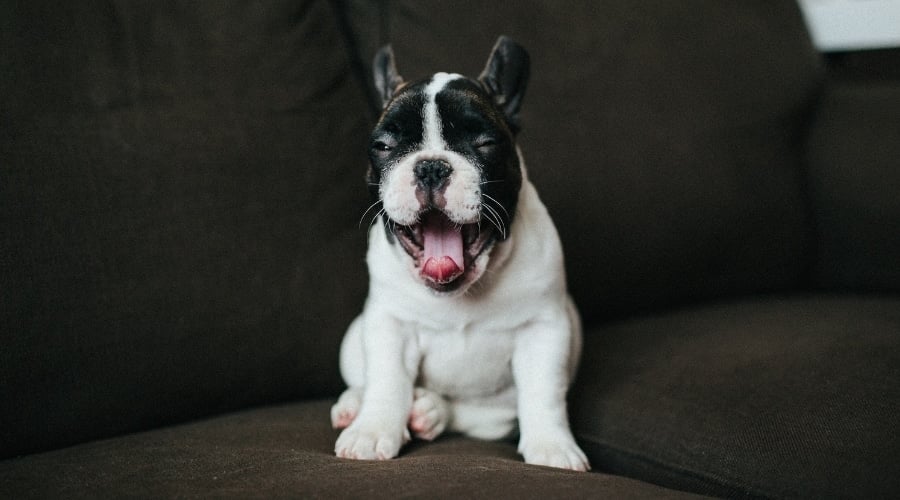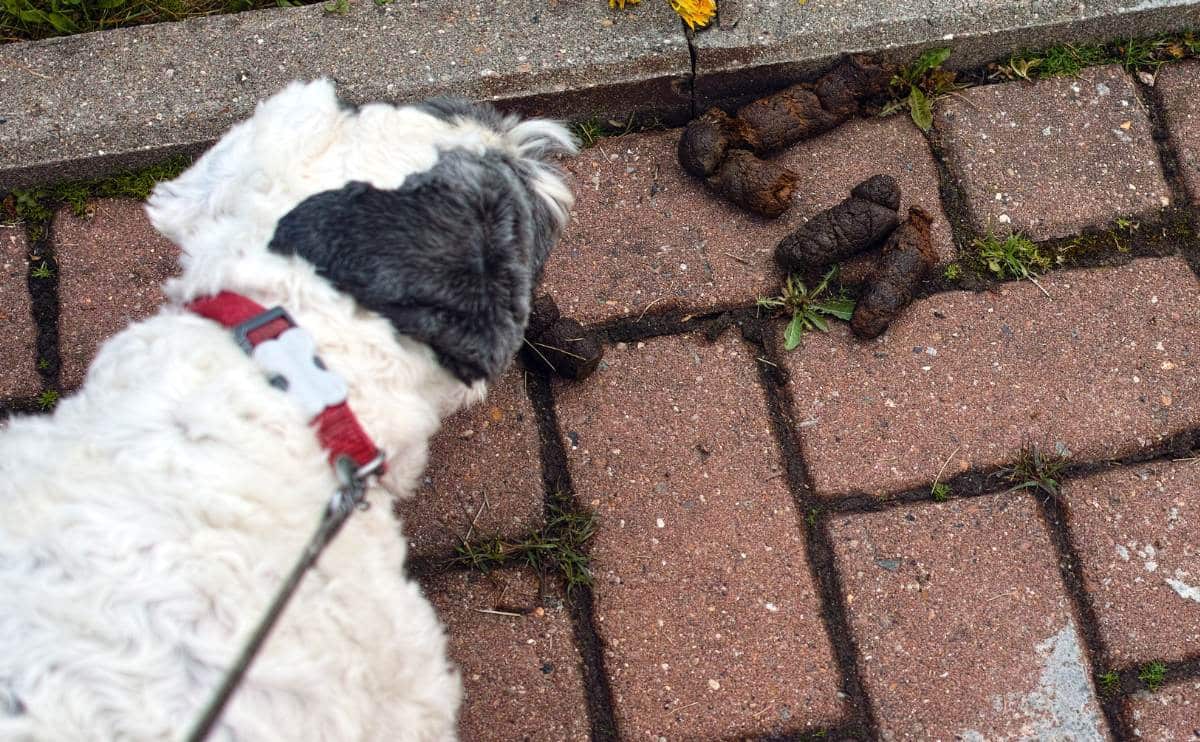Paw-Licking: The Canine Version of Doomscrolling Or A Red Flag For A Serious Health Issue?
When you purchase through links on our site, we may earn a commission. Here’s how it works.

Ever catch your dog licking their paws like they just stepped in something suspicious? A little paw-licking is normal—just part of a dog’s self-grooming routine. But when it turns into an obsessive, nonstop ritual, there’s usually something more going on.
Table of Contents
If your dog constantly licks or chews their paws, it could be a sign of pain, allergies, or a behavioral issue. So, when should you worry? We’ll explain the reasons behind excessive paw-licking and help you determine when to call the vet.
The Most Common Reasons Dogs Lick Their Paws
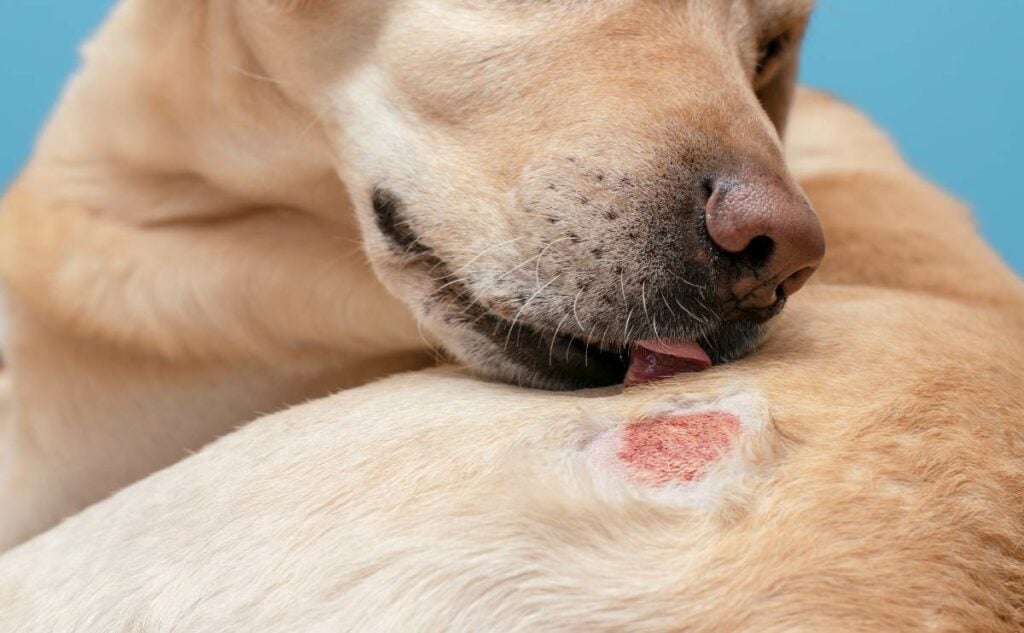
If your dog is methodically munching on their mitts, something isn’t right. Whether it’s itchiness, irritation, or pain, there’s always an underlying cause—some are more serious than others.
Injury: When A Sore Paw Becomes An Obsession
If your dog suddenly starts fixating on one paw, an injury is a likely culprit. Unlike general itchiness that affects both paws, an isolated paw-licking spree often means something hurts, stings, or feels off.
Dogs can easily injure their paws without you noticing—whether it’s a splinter from rough terrain, a torn nail from playing too hard, a bee sting from sniffing in the wrong place, or painful blisters from hot pavement. Even something as small as a burr stuck between their toes can drive them to lick obsessively.
Common Paw Injuries That Trigger Excessive Licking
- Burns and blisters: Hot pavement, ice, or chemicals like de-icing salts can cause painful paw pad burns
- Cuts and scrapes: Sharp objects like glass, rocks, or thorns can leave tiny wounds that dogs obsess over
- Foreign objects: Burrs, splinters, or small pebbles lodged between toes can cause constant discomfort
- Puncture wounds: Sharp objects or insect stings can leave hidden wounds that lead to swelling and irritation
- Torn or cracked nails: A broken nail can be extremely painful and may bleed or become infected
How To Check For Injuries
Start by carefully examining the entire paw, not just where they’re licking. Check:
- Between the toes: Look for stuck debris, thorns, or swelling
- Paw pads: Check for cuts, burns, cracks, or raw spots
- Toenails and nail beds: A torn nail can be painful and prone to infection
- Top of the foot: Bee stings, bruises, or abrasions might not appear immediately
If you spot a minor wound, you can likely handle it at home:
- For a bee sting, gently remove the stinger, apply a cold compress, and watch for swelling
- For minor cuts or scrapes, clean the area with warm water and pet-safe antiseptic
- For mild burns or blisters, use aloe vera or a pet-safe balm to soothe irritation
- For a splinter or debris, carefully remove it with tweezers and rinse with saline
When to See a Vet
Call your vet immediately if the injury is deep, bleeding excessively, swollen, or oozing, or if your dog refuses to put weight on the paw. Licking can worsen minor wounds, turning them into infections requiring medical treatment.
Growth Or Abscess: A Hidden Cause Of Constant Licking
If your dog keeps licking the same paw, a hidden lump, growth, or abscess could be the reason. As you inspect their foot, you may notice swelling, a raised bump, or a tender area beneath the skin. Even small growths can cause significant discomfort, prompting excessive licking.
Common Types Of Growths And Lumps On A Dog’s Paw
- Abscess: A pocket of pus under the skin, often caused by a puncture wound, insect bite, or infection. Abscesses may feel warm, swollen, and painful and can sometimes rupture, releasing foul-smelling fluid.
- Cyst: A fluid-filled sac that commonly develops between the toes or on the paw pads. While some cysts remain harmless, others may become infected or large enough to interfere with walking.
- Tumor: A lump that may be benign or cancerous. Tumors vary in size and texture, and some may grow quickly. Early detection is key to determining the best course of action.
What To Look For
When checking your dog’s paws, watch for:
- Limping or reluctance to put weight on the paw
- Oozing, pus, or a foul odor
- Redness, tenderness, or discoloration
- Sensitivity when touched
- Swelling or raised bumps
When To See A Vet
A veterinarian should evaluate any lump, growth, or abscess. Your vet may perform a fine-needle aspiration or biopsy to determine whether it is a cyst, abscess, benign tumor, or something more serious.
- Small, non-threatening cysts or abscesses may be treated with warm compresses, drainage, or antibiotics
- Larger growths or tumors may require surgical removal, especially if they interfere with movement or pose a health risk
- Licking can introduce bacteria and worsen the condition, leading to infection and additional complications
If your dog shows discomfort, limping, or persistent licking, schedule a vet visit as soon as possible. Early treatment can prevent further pain and ensure the best outcome for your pet.
Dermatitis: When Skin Irritation Turns Into An Itchy Obsession
If your dog’s paws seem to be their new favorite chew toy, dermatitis could be to blame. Dry, itchy, and inflamed skin often triggers excessive licking, and environmental allergies are a common culprit. Some dogs are sensitive to specific irritants they encounter outside, while others react to everyday household substances.
Common Causes Of Dermatitis In Dogs
- Chemical irritants: Yard treatments, pesticides, household cleaners, and even de-icing salt can trigger allergic reactions
- Contact irritants: Certain carpets, synthetic fabrics, or new bedding materials may cause skin sensitivity
- Environmental allergies: Grass, weeds, pollen, mold, and dust mites can cause itching and irritation, especially in certain seasons
- Excessive moisture: Constant exposure to wet grass, damp sidewalks, or standing water can lead to fungal or bacterial infections
How To Help Relieve Paw Irritation
- Avoid walking on treated grass or salted sidewalks if your dog has a history of skin sensitivity
- Keep indoor spaces clean by vacuuming regularly and using pet-safe cleaning products
- Rinse or wipe paws after walks to remove allergens and chemicals before they cause irritation
- Try an anti-itch spray or medicated wipes to reduce inflammation and soothe discomfort
- Use a paw balm or moisturizer to hydrate the skin and protect against dryness
When To Call The Vet
Contact your veterinarian if your dog’s itching is severe, persistent, or accompanied by redness, swelling, or hair loss. They may recommend allergy testing, prescription-strength anti-itch treatments, or dietary changes to help manage the underlying cause.
Left untreated, constant licking can break down the skin’s protective barrier, leading to secondary infections that require more intensive treatment. Catching and addressing the issue early can prevent further discomfort for your dog.
Food Allergies: When Mealtime Leads To Itchy Paws
Food allergies could be the culprit if your dog licks their paws excessively and frequently has digestive issues. Some dogs develop sensitivities to common ingredients like chicken, beef, dairy, eggs, wheat, and soy, which can trigger chronic itchiness, skin irritation, and gastrointestinal discomfort.
How To Identify A Food Allergy
Diagnosing food allergies can be tricky, as symptoms often overlap with environmental allergies. Food sensitivity may be to blame if your dog’s paw licking comes with frequent stomach issues or ear infections.
Some options for determining whether food allergies are the cause include:
- Veterinary allergy testing: Your vet can conduct blood tests or recommend elimination diets
- At-home allergy test kits: Some pet owners use saliva-based allergy tests to identify potential triggers
- Elimination diet: Switching to a limited-ingredient or hypoallergenic diet can help isolate problem ingredients
How To Help A Dog With Food Allergies
- Transition to hypoallergenic or limited-ingredient diets that eliminate common allergens
- Look for dog food with novel proteins like duck, venison, or fish if traditional proteins cause issues
- Avoid dog treats or table scraps containing potential allergens
- Work with your vet to develop a long-term dietary plan that reduces symptoms
When To See A Vet
If your dog’s paw licking is accompanied by chronic digestive issues, frequent ear infections, or unrelenting skin irritation, consult your veterinarian. They can help determine whether food allergies are the cause and guide you through an effective treatment plan.
Parasites: Tiny Invaders That Make Paws Unbearably Itchy
External parasites are a significant cause of relentless paw licking, as fleas and mites can irritate a dog’s skin. These tiny pests irritate the skin, causing dogs to chew, bite, and lick their paws to relieve the discomfort.
Common Parasites That Trigger Excessive Paw Licking
- Fleas: These fast-moving insects bite and leave behind itchy, inflamed skin. Some dogs develop flea allergy dermatitis, making even a few bites unbearable.
- Mites (mange): Microscopic mites burrow into the skin, causing hair loss, redness, and severe itching. Mange can affect any part of the body, including the paws.
- Ticks: While less common on paws, ticks can latch between the toes, leading to irritation and excessive licking.
How to Check for Parasites
- Inspect your dog’s fur, especially around the paws, for tiny black specks (flea dirt), redness, or scabs
- Look between the toes for signs of mites, ticks, or irritated skin
- Pay attention to hair loss, crusty patches, or intense scratching beyond just the paws
Treatment And Prevention
- For fleas: Use a flea comb, medicated shampoo, and flea prevention treatments to eliminate the infestation. Read our article covering how to get rid of fleas on dogs.
- For mites (mange): Treatment depends on the type of mange and should be prescribed by a vet. Some cases require medicated dips, oral medications, or topical treatments.
- For ticks: Carefully remove them with fine-tipped tweezers, ensuring the head is fully extracted. Read our article covering how to safely remove a tick from a dog.
Pain: When Licking Is A Coping Mechanism
Dogs don’t just lick their paws because of surface irritation—sometimes, the behavior is a response to deeper pain. Arthritis, nerve issues, joint discomfort, or internal injuries can all lead to excessive licking, even when the pain isn’t directly in the paws. Some dogs use licking as a way to self-soothe, much like humans rubbing a sore muscle or biting their nails when anxious.
Common Pain-Related Causes Of Paw Licking
- Arthritis and joint pain: Older dogs and large breeds are more prone to arthritis, which can cause stiffness, discomfort, and mobility issues
- Generalized pain or illness: Internal discomfort, such as abdominal pain, can sometimes manifest as paw licking
- Injuries or post-surgical pain: Dogs recovering from an injury or surgery may lick as a response to lingering discomfort
- Nerve pain or back problems: A pinched nerve or spinal issue may lead to redirected licking, even if the pain is elsewhere
Signs Your Dog’s Licking Is Due To Pain
- Avoiding stairs, jumping, or specific movements
- Difficulty getting up or lying down
- Increased irritability or sensitivity when touched
- Limping or favoring one side
- Stiffness, especially after rest
When To See A Vet
If your dog is licking their paws without visible wounds, swelling, or irritation, an underlying pain condition could be the cause. A veterinarian can perform a thorough exam, check for joint stiffness, and recommend treatment options such as pain management medication, joint supplements, or physical therapy.
Ignoring pain-related licking can lead to further complications, including lick granulomas—raw, inflamed areas that develop from excessive licking over time. The sooner the root cause is identified, the sooner your dog can find relief.
Behavioral Problems: When Licking Becomes A Habit
If your veterinarian has ruled out medical issues, your dog’s paw licking may be driven by boredom, stress, or anxiety. Just as people bite their nails or twirl their hair when nervous, dogs often develop repetitive behaviors to cope with emotions.
Common Behavioral Reasons For Excessive Paw Licking
- Boredom: Dogs left alone for long periods without mental or physical stimulation may lick their paws to pass the time
- Separation anxiety: Some dogs use licking as a self-soothing mechanism when they feel stressed about being alone
- Compulsive Behavior: In some cases, repetitive licking becomes an obsessive habit, similar to obsessive-compulsive disorder in humans
Signs That Licking Is Behavior-Related
- Your dog primarily licks when they are alone or inactive
- There are no visible signs of irritation, swelling, or injury
- The licking occurs in specific situations, such as before bed or when left home alone
How to Reduce Stress-Related Paw Licking
- Increase physical activity: Daily walks, playtime, and interactive toys help burn off excess energy
- Provide mental stimulation: Puzzle toys, slow feeders, training sessions, and food-dispensing toys (including snuffle mats) keep their brain engaged
- Offer chews or lick mats: Redirect their licking behavior to appropriate items
- Address anxiety: If licking is due to separation anxiety, consider desensitization training or supplements like calming treats
If the licking is frequent and difficult to control, consult your veterinarian or a canine behaviorist to determine if additional training or medical intervention is needed.
The Hidden Risk: When Paw Licking Leads To Infection

Paw licking may start as a response to irritation, allergies, or discomfort, but it can cause more serious harm than good if it becomes excessive. Constant licking breaks down the skin’s natural barrier, creating the perfect environment for bacteria and yeast to thrive. Over time, this can lead to painful skin infections that worsen the licking—a vicious cycle that can be difficult to stop.
Signs Of Infection From Excessive Paw Licking
- A strong, unpleasant odor
- Crusty, scabby, or oozing sores
- Hair loss or bald patches around the paws
- Increased licking, biting, or sensitivity when touched
- Red, swollen, or inflamed skin between the toes
How To Prevent And Treat Infection
- Apply vet-approved ointments: Topical treatments can help soothe irritation and fight bacterial or fungal growth
- Interrupt the licking cycle: Use an e-collar, anti-lick spray, or bandages to prevent further irritation
- Keep paws clean and dry: Regularly wash your dog’s paws with a mild, pet-safe cleanser, especially after walks
- See a vet if symptoms worsen: If swelling, pus, or a foul odor develop, prescription antibiotics or antifungal treatments may be needed
Untreated infections can spread and become more serious, leading to pain, limping, and even more obsessive licking. If your dog’s paws show signs of infection, early intervention is key to breaking the cycle and preventing further complications.
How Pet Insurance Can Help

Most active pet insurance policies cover treatment for new conditions related to paw licking and other skin issues. If you discover that your dog suffers from chronic skin conditions, your existing pet insurance policy may be an excellent way to help cover the treatment cost as well as other health conditions that may arise. Read our best pet insurance reviews to find a company that fits your needs.
How To Stop Your Dog From Licking Their Paws
Once you’ve identified why your dog is licking their paws, the next step is breaking the habit and addressing the root cause. Avoiding excessive licking can prevent infections and long-term damage, whether it’s from allergies, injury, pain, or stress.
Vet Treatment Options
If a medical condition is behind the licking, your vet may recommend:
- Medications: Antibiotics for infections, antifungals for yeast overgrowth, or anti-inflammatory drugs for allergies and pain
- Parasite treatment: Flea and mite infestations require prescription-strength preventatives or medicated baths
- Pain management: If arthritis or nerve pain is the issue, physical therapy or pain medication may help
- Prescription allergy relief: Options include antihistamines, steroids, or long-term treatments like Apoquel or Cytopoint
At-Home Remedies And Prevention
For mild cases or ongoing maintenance, you can try:
- Itchy skin home remedies, like aloe very gel and coconut oil
- Natural pain relief remedies, including herbs and supplement blends
- Paw cleanser or paw wipes after walks to remove allergens, dirt, and irritants
- Paw balm or moisturizer to help protect the skin and prevent dryness or cracking
- Paw-licking home remedies, including apple cider vinegar and colloidal oatmeal
- 20 fitness activities for you and your dog to banish boredom and keep your pup feeling happy and healthy
When To Use A Protective Barrier
If your dog’s licking is severe, you may need to temporarily block access to their paws to allow healing. Options include:
- An e-collar (cone of shame): Prevents licking while wounds or infections heal
- Bandages or wraps: Can be used for short periods to prevent further damage but should be monitored to avoid discomfort
- Dog booties or socks: Protect paws from allergens, cold surfaces, and irritation
When To Call A Vet
If your dog’s licking persists despite home remedies, or if you notice signs of infection, pain, or worsening symptoms, a vet visit is necessary. Persistent licking may indicate an underlying medical condition that requires professional treatment.
Catching and addressing the issue early is the best way to prevent complications and keep your dog comfortable.
Frequently Asked Questions
Many dog owners wonder why their pets lick their paws at certain times or under specific circumstances. Below are answers to some of the most common questions about this behavior. Don’t see yours? Ask us in the comments!
Why Do Dogs Lick Their Paws Before Bed?
If your dog has a habit of licking their paws before settling down for the night, it could be part of their self-soothing routine. Just like people unwind with certain bedtime habits, some dogs find comfort in licking. However, frequent or intense licking before bed may signal allergies, joint pain, or anxiety.
If your dog only licks their paws occasionally before sleeping and shows no other signs of discomfort, it’s likely just a normal calming behavior. But if the licking is excessive or persistent, consider checking for underlying medical conditions or sources of stress.
Why Do Dogs Lick Their Paws After They Eat?
Some dogs instinctively lick their paws after meals as part of their grooming process, similar to how cats clean themselves. However, in some cases, this behavior could be linked to food allergies or acid reflux.
If your dog frequently licks their paws after eating and experiences digestive issues, such as vomiting, diarrhea, or excessive drooling, consult your veterinarian. A dietary change may be necessary to eliminate potential allergens or address gastrointestinal discomfort.
Protect Your Dog’s Feet With Booties
Another great way to keep your dog’s paws clean and undamaged is by protecting them with winter booties and dog shoes for hot pavement. These dog boots are an inexpensive way to keep pollen, dirt, foreign objects, chemicals for snow removal, and many other irritants from getting on your dog’s paws in the first place.
Why Trust Canine Journal?
Sally has over 20 years of experience in human health sciences communications, including 10 years as an expert on pet health conditions and treatment. She’s also spent over a decade researching dog behavior and training methods as part of an expert team at Canine Journal. As dedicated canine professionals and long-time dog owners, we test and research the best pet products and solutions to common dog concerns, not only for our own pups but for all of our readers.
